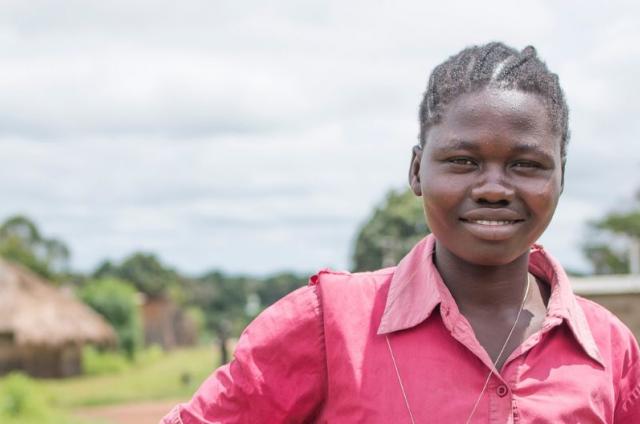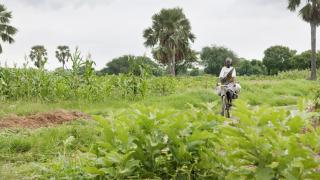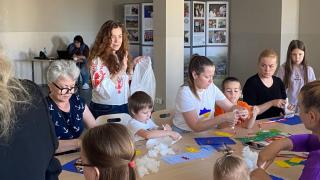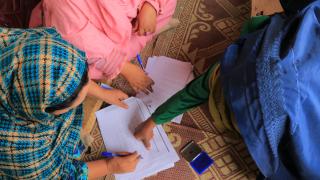Silent No More: Together Against Violence
After years of silent suffering, the women of South Sudan are beginning to speak out. About really difficult topics. In public.
A recent report from the UN Commission of Human Rights stated that South Sudan is one of the most dangerous places in the world for women and girls to live. The report used the word “hellish". Not only because of persistent hostilities, widespread famine and climate-change related catastrophes, but also because there is an intense level of conflict-related sexual violence that is endemic to the culture.
Content warning: the following article contains graphic mentions of rape and sexual violence. Please stop reading here if you are likely to find these triggering.
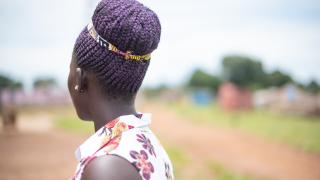
Staggeringly brutal and prolonged gang rapes perpetrated against them by multiple men, often while their husbands, parents or children have been forced to watch, helpless to intervene.
The perpetrators? Often, soldiers. Many view women, or their bodies, as 'spoils of war', in lieu of wages. And other abusers include high government officials.
The resulting trauma, says the report, “ensures the complete destruction of the social fabric.”
Says Yasmin Sooka, chair of the UN Commission: “It is outrageous and completely unacceptable that women’s bodies are systematically used on this scale as the spoils of war. Urgent and demonstrable action by authorities is long overdue, and South Sudanese men must stop regarding the female body as 'territory' to be owned, controlled and exploited.”
But we know that intimate-partner violence and domestic abuse is also a serious problem. Even though the present constitution, initiated in 2011 when the country gained independence, allows certain rights for women, there is still a deep-seated cultural bias against giving them full access.
Traditionally, from birth, South Sudanese girls are considered little more than mere currency. Over 50% of girls are given away by their families as child brides in exchange for a significant dowry, like cattle. This economic exchange is vital for the family’s survival. Getting divorced would mean returning that dowry, at great hardship. And even when these girls are older, they do not enjoy economic rights or have a say in family and community level decisions.
Miriah John, our Advocacy Coordinator in South Sudan, explains: “It’s an environment that breeds violence, one that can take the form of beatings and torture, especially when men are under the influence of alcohol and drugs.” As a result, Miriah says "violated women are left feeling unsafe, hurt and helpless."
Our year-long Stronger Women, Stronger Nations programme equips women with business skills and social empowerment training to take on a more powerful role in their families. But first, says Miriah:
Women must be informed of their rights.
- According to South Sudanese law, rape is a criminal offence and perpetrators of rape should be punished.
- Every woman has a right to life and dignity; all human rights should be protected.
- Victims of Violence Against Women (VAW) should be immediately referred to access response services, which include medical attention, psychosocial support and legal assistance.
Our year-long training programme teaches women about their rights, so that they can better care for themselves and their families. The women in our programme also share newfound information with their sisters, friends and neighbours, spreading knowledge about their rights throughout their communities. And some of our graduates want to take this even further.
In our Change Agents programme, graduates are able to continue learning about their rights alongside training on leadership and advocacy, to support them in driving change for their communities. They learn the communications skills they need to become advocates and take meaningful action.
To combat a new wave of VAW in South Sudan, some Change Agents there have found an innovative way to raise awareness in their community. Unable to count on reliable internet access or connection, Change Agents are making waves via radio, specifically Spirit FM, one of the leading radio stations in Yei River State, where our office is based.
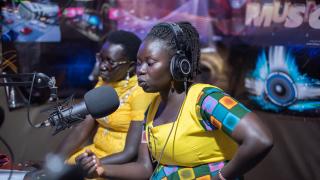
Founded in 2004, the radio station encompasses a 150-kilometer radius, with coverage spreading into neighbouring towns and countries including Uganda and the Democratic Republic of Congo. It’s estimated that over two and half million people listen to the radio station daily.
The show covers a wide range of topics, with the most popular including:
- Violence Against Women
- Women’s rights and advocacy
Women call in from all corners of the region, sharing stories and asking questions, allowing programme leaders to gain a deeper knowledge of their needs.
Most importantly, the listening audience discovers they are not alone.
"I myself am a survivor of forced marriage," shared Sylvia, a Women for Women International Change Agent, on one recent radio programme. She explained she had become pregnant as a teenager and was forced to leave school and marry the man who impregnated her. “I regret it until today. My husband passed on after my first child and I was still forced into another marriage. I wish I had continued with my education."
To speak out so freely in South Sudan requires enormous courage, for many reasons. Women encounter many obstacles accessing the justice system, not the least of which are threats of physical retaliation against them and their families. Sometimes out of shame, men will abandon a wife who has been abused by others. And even if a woman wanted to sue, many of the roads to the courthouses have been washed away by floods.
But as Miriah explains, our programme offers participants the opportunity to learn how to protect themselves in a new way – by taking a stand together. She says: "By coming out and sharing their stories, our participants believe they help empower other women who may be going through similar issues but have not yet sought support."
When Charity Sande, a Change Agent in Jansuk, joined our programme, she had been suffering like many other women in South Sudan with no real recognition of her personal or civic power.
A woman has a right to possess land, a woman has a right to inheritance, a woman has a right to education. She also has a right to participate in leadership and decision-making in community.
During another session, Change Agents in Jansuk gathered to compose a song they plan to sing as they implement their action plans.
The world is a harsh place. Let’s arise and strive to be change agents to make the community a better place.
In a country where women face a high risk of various forms of violence, this song is surely an anthem of hope and a call to self- and group- empowerment.
keep reading
On a Roll Towards Empowerment
subtitle:
For women entrepreneurs in our Stronger Women, Stronger Nations programme, owning a bicycle has helped them grow their businesses and support their families. Read Mukunde and Alphonsine's stories.
Women for Women International CEO, Laurie Adams, reflects on her visit to Poland to see how the survivors of the Russian invasion on Ukraine are able to maintain hope amidst chaos.
Afghanistan: We're Here To Stay
subtitle:
One year into the humanitarian and economic crisis in Afghanistan and the situation continues to worsen. Read about how we at Women for Women International are supporting our Afghan sisters.

